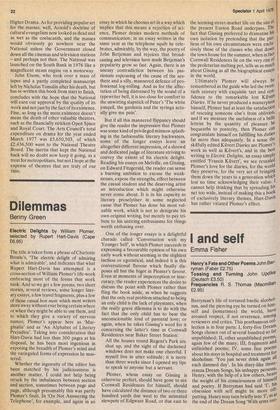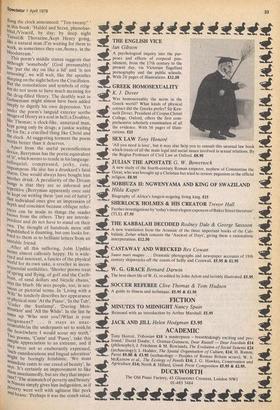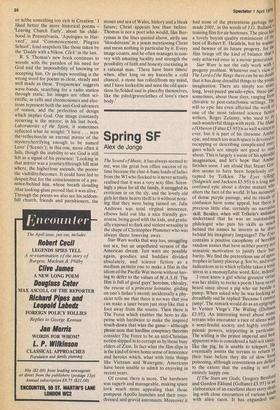I and self
Emma Fisher
Henry's Fate and Other Poems John Berryman (Faber £2.75)
Tossing and Turning John Updike (Deutsch £3.50)
Frequencies R. S. Thomas (MacMillan £2.95) Berryman's life of tortured bardic alcoholism, and the piercing eye he turned on himself and (sometimes) the world, have aroused respect, if not reverence, among reviewers and critics. This posthumous elk lection is in four parts: I, forty-five Dreary Songs chosen out of several hundred so far unpublished; II, other unpublished poems, again few of the many; III, fragments and unfinished poems; IV, some fine poeMs about his stays in hospital and treatment for alcoholism: 'You just never drink again all each damned day'. In his diary-like three' stanza Dream Songs, his unhappy persona Henry, with the help of a few others, bears the weight of his consciousness of himse!f and poetry. If Berryman had said `I's his obsession with self might be more offputting. Henry may turn briefly into T, an at the end of the Dream Song 'With arms out flung the clock announced: "Ten-twenty" ' In this book: 'HaIdol and Serax, phenobarbnal,Nivactil, by day; by deep night T.uinal/& Thorazine,/kept Henry going, like a natural man./I'm waiting for them to work, as sometimes they can,/honey, in the bloodstream.'
This poem's middle stanza suggests that although 'somebody' (God presumably) has 'put the sky on like a lid' and 'is not returning', we will wait, like the apostles sleeping on the night before the Crucifixion. 13. ut the consolations and symbols of religion do not seem to have much meaning for the drug-filled Henry. The deathly wait in Gethsemane might almost have been added simply to dignify his own depression. Yet linder the poem's languid exterior seethe images of Henry as a soul in hell; a Doubter, like Thomas; a clock-like, unnatural man, kePt going only by drugs; a junkie waiting for his fix; a crucified thing like Christ and the clock. At suggesting torment the poem works better than it deserves.
Apart from the useful personification device, Berryman has the poetic equivalent of It', which seems to reside in his language: Colloquial, compressed, jerky, cute, ITPompous. He also has a drunkard's fatal charm. One would always have bought him another drink. A peculiarity of the Dream Songs is that they are so informal and riePetitive k Berryman apparently once said ne kept on writing them 'just out of habit') that individual ones give an impression of dePth and concision because oblique refer
!flees can be made to things the reader Knows from the others. They are interdePendent and do not have to stand on their
"'tn. The thought of hundreds more still unpublished is daunting, but one looks forward to them as to brilliant letters from an enstable friend.
After all this suffering, John Updike seems almost callously happy. He is wide
eyed and innocent, a fancier of the physical
World for its own sake, a reveller in inconsequential sordidities. 'Shorter poems treat °bf spring and flying, of golf and the Carib ean, of sand dollars and bicycle chains,' saYs the blurb. He sees people, too, in sen xi,sli°os or pictorial terms. In 'Living with a " ife' he tenderly describes her appearance °I. Physical state 'At the Piano', 'In the Tub', nder the Sunlamp', 'During Menstruation' and 'All the While'. In the last he suits up 'Who sent you?/What is your 4ssignment7 ... it stays as unacountable/as the underpants set to soak/in Te bowl/where I would scour my teeth.' .w° Poems, 'Cunts' and 'Pussy', take this
ntPle appreciation to an extreme, and if the were not so exuberantly expressed,
such cunnilocutions and lingual adoration' Might be boringly fetishistic. 'We must assimilate cunts to our creed of beauty', he StLaYS. It's certainly an improvement to like s`tent unashamedly, but are they that imporant? 'The mismatch of poverty and beauty' In Nassau simply gives him indigestion, as if Poverty went well with ugliness like pork st itsfsfststst Atieststst and beans: 'Perhaps it was the conch salad,
or is/the something too rich in Creation.' I liked better the more historical poems — 'Leaving Church Early', about his child-. hood in Pennsylvania, 'Apologies to Harvard', and 'Commencement, Pingree School'; fond snapshots like those taken by the 'Daddy with a Nikon. Click' in the last.
R. S. Thomas's new book continues to wrestle with the paradox of his need for God and the impossibility of knowing or accepting him. Or perhaps wrestling is the wrong word for poems as clear, steady and well made as these. 'Frequencies' suggests wave-bands, searching for a radio station through static; his images are often scientific, as cells and chromosomes and electrons represent both the anti-God advances of reason, and the perfection of design which implies God. One image constantly recurring is the mirror; in his last book, Laboratories of the Spirit, it sometimes reflected what he sought: 'I have . . . seen the.reflection/in an eternal mirror of the mystery/terrifying enough to be named Love' ('Scenes'); in this one, more often it fails, though the inability to see God is still felt as a signal of his presence: 'Looking in that mirror was a journey/through hill mist where, the higher/one ascends, the poorer the visibility/becomes. It could have led to despair/but for the consciousness of a presence/behind him, whose breath clouding /that looking-glass proved that it was alive.' Through the poems we also see his seldomfull church, friends and parishioners, the stones and sea of Wales, history and a bleak future; Christ appears less than before. Thomas is not a poet who would, like Berryman in the lines quoted above, airily use 'bloodstream' in a poem mentioning Christ and mean nothing in particular by it. Every image counts, and he often manages to convey with amazing lucidity and strength the possibility of faith and honesty coexisting in a rational man. 'There have been times/ when, after long on my knees/in a cold chancel, a stone has rolled/from my mind, and I have looked/in and seen the old questions lie/folded and in place/by themselves, like the piled/graveclothes of love's risen body.'




































 Previous page
Previous page